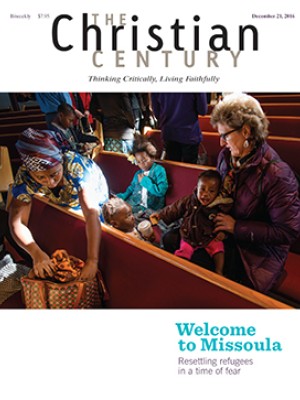The baptismal text begins a pattern in Jesus’ ministry that I’m not sure is taken with enough seriousness: Jesus continually empowering the church for service rather than limiting that power to himself.
In Matthew’s text it seems likely that Jesus’ baptism hearkens toward Matthew’s inclination to weave his narrative of Jesus’ ministry into the scriptural foundations of messianic expectation. When taken in concert with all four Gospels, however, a subtle but powerful pattern emerges: the very crux of Jesus’ messianism is empowerment of the church, of all those who will come after to continue God’s mission of giving life.
John’s protest that he should be baptized by Jesus and not the other way around presents in its own way a kind of foreshadowing of what will come immediately after in Matthew’s Gospel: the temptation in the wilderness. Now we can assume that John’s intentions in the request for Jesus to baptize him were born out of sincere awe and respect for what he believed Jesus to represent, and we can assume more malicious intentions from the devil that Jesus encounters in the wilderness. But what unites both episodes is the temptation for Jesus to arrogate to himself a messianic authority that would be centered upon consolidating power—the Messiah baptizes and not the other way around, the Messiah rules the earth rather than serving it, etc. Jesus’ demurral at his baptism is the messianic demurral of arrogation that will define his ministry.
Read our latest issue or browse back issues.
Throughout all four Gospels we see the remarkable insistence on the part of Jesus that the power to heal the world in and through which Jesus has been sent is something that, by the power of the Holy Spirit, Jesus intends to share with the church, and to multiplying effect. In John, Jesus argues that, contrary to the disciples’ expectations, it’s better for them if he departs so that the Holy Spirit can do its work of constituting their ministry, and that of their descendants (John 16:7); he had already made the claim that those coming after him would do “greater things” (John 14:12). Meanwhile, the entire sweep of Luke-Acts is designed to demonstrate how the church recapitulates and enhances Jesus’ ministry by undergoing the same sort of trials, changes in tactics and audience, persecutions, and healing victories that Jesus himself endures on earth.
Like all aspects of Jesus’ ministry, the baptism of Jesus is localized and indexed to a particular time and place—this river, this baptism, these people, this given need for healing, this context. This localization is the very heart of incarnation. It’s from this beating heart of particularity and deep immersion in context that Jesus begins his ministry. He points toward the ways in which the Messiah comes—not to gather power, but to disperse it, to empower (a ministry that begins in the kenosis of the incarnation itself)—then continues through the scandal of the cross and moves with us into the present day, when the church seeks to stay faithful to its task of embodying Christ on earth.
However, lest such an ecclesiology lead the church into arrogance—“We are the ones doing the greater things!”—we note that the diffusion that Jesus practices in the Gospels is more radical than we sometimes want to admit. Sometimes the “greater things” are done by those into whose hands we might not be inclined to commend such ministry: tax collectors, Roman soldiers, or Samaritans. Those of us formed by font and table, those who have heard the proclamation that we are God’s beloved and pledge to follow the Messiah, should expect that words of truth, justice, and healing will be spoken outside our walls for our hearing, and that deeds pleasing to God will be carried on by those who do not make their home in our ecclesial spaces. This encompasses a venerable scriptural pattern, from the chastening of Israel to the Syrophoenician woman who upends the disciples’ understanding of Jesus’ ministry. Whenever we think we have established the borders of God’s empowerment to ministry, the Holy Spirit sets up camp just beyond them.
In my own tradition it’s common for the Christ candle that is lit prominently during baptismal services to be equally prominent in funerals—the completion of the baptismal journey. As our ministry on earth is inaugurated, so we carry through to the end. This is also the case with Jesus—his baptism signals and encompasses the entire sweep of what is to come in his ministry, and the shape that it will take.
If every baptized Christian is to be, as theologian Kathryn Tanner has argued, a kind of minister of God’s unendingly generous blessing upon all creation, then we can take our bearing and orientation from the promises made in our immersion—we will be as deeply immersed in the world as Jesus is, called to love it more than it loves itself and to take the opportunity to empower the giving of life rather than restrain it.





